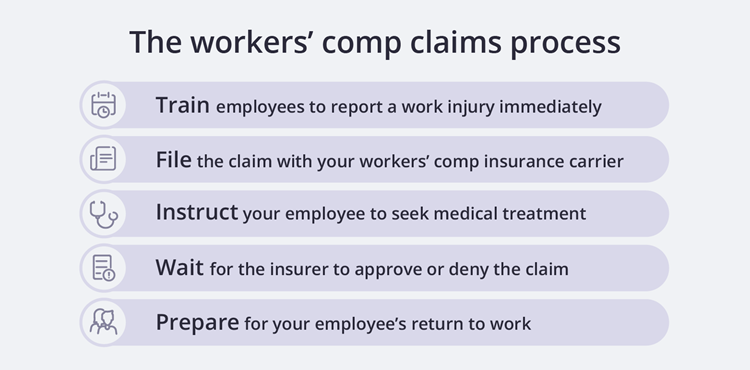How does workers’ compensation work?

Since it’s required by law, many business owners sign up for workers’ compensation coverage without actually understanding what it does or how it works. This inevitably leads to a lot of confusion as soon as an employee makes a claim.
To be prepared for a claim, you need to know what to expect. Here’s a rundown on the basics of workers’ comp insurance.
What is workers' compensation?
Workers’ compensation insurance covers an employee’s medical care costs and wage replacement for work-related injuries and illnesses. Nearly every state requires businesses with employees to have workers’ comp coverage.
Most policies include employer's liability insurance, which shields employers from lawsuits once an employee has accepted workers' comp benefits.

Who needs workers’ comp insurance?
If your company has at least one employee, you need workers’ comp insurance. In fact, many state laws require businesses to purchase this coverage as soon as they hire their first employee.
There are a few exceptions, though. Texas and South Dakota are the only states where workers’ compensation insurance is optional for employers. Other state workers' compensation laws don’t require the coverage until a company hires its second, third, or fourth employee.
Even if your business is in a state that doesn’t require a workers’ comp insurance policy for just one employee, you should still strongly consider a policy as soon as you hire someone.
If that employee suffers a work-related illness or is injured on the job, you could be left paying for some hefty legal and medical bills.
Benefits of workers’ comp coverage
Workers’ compensation insurance safeguards both your business and your employees.
Workers’ comp insurance protects your small business
Workers’ comp protects your small business when an employee becomes ill or injured on the job.
It will pay for the employee’s medical expenses and partial lost wages – expenses you’d likely have to pay out-of-pocket if you didn’t have coverage. Most policies also include a death benefit to help reduce the financial burden of funeral expenses if an employee suffers a fatal accident at work.
In most states, a workers’ compensation policy will also include employer’s liability insurance. Policies with this benefit will cover legal fees, settlements, and judgements if an employee decides to sue your company over their injuries.
If your business is in a state where workers’ comp insurance doesn’t include employer's liability coverage, like states with a workers’ compensation state fund, you may want to purchase stop gap insurance to protect you from employee lawsuits.
Workers’ comp insurance protects your employees
A work-related injury or illness could be devastating for an employee – especially if it means an extended absence.
Workers’ compensation makes sure your staff are taken care of if they’re unable to work due to a work-related injury or illness. It will pay a portion of their missed paychecks and cover any medical expenses they racked up because of the incident.
Plus, your employees are always protected. Workers’ comp is no-fault coverage that pays out even if the employee is to blame for their injury.

How does the workers’ comp claims process work?
Communicating clearly with an injured employee will make the workers’ comp claims process much easier for both you and your employee. Here’s what you can expect to happen, and what you’ll need to do, after an employee reports an on-the-job injury:
Train employees to report a work injury immediately
You and your injured employee usually have a limited amount of time to file a workers’ comp claim. As the employer, it’s typically your responsibility to file a claim with your insurer, but first you must have your employee fill out paperwork, like documentation of the date, time, and circumstances of the injury. As part of the claims process, you’ll probably need to provide:
- A completed claim form and other documentation to your insurer
- A report of injury to your state workers’ compensation board
Instruct your employee to seek medical treatment
As soon as possible, your injured worker should seek medical treatment for their injuries or illness. Depending on the severity of the injury, this could happen before or after you begin the claims filing process.
The health care provider who attends to the employee will fill out a medical report after treatment. In most cases, the employee’s provider will need to send that report directly to the insurance company. This information will be used to determine what medical bills are related to the workers’ comp claim.
File the claim with your workers’ comp insurance carrier
In most cases, you’ll be responsible for filing the workers’ compensation claim with your insurance company.
You’ll send in the employee’s claim form to your insurance provider and any forms and documentation to your state’s workers’ comp board. Note that in many states you’ll have to report any workplace injuries, even if the employee isn’t filing for workers’ compensation benefits.
Wait for the insurer to approve or deny the claim
Once you’ve filed all of the paperwork, your insurance carrier will decide whether the employee’s claim is valid.
If the insurance provider approves the claim, the employee can either accept the payment offered by the insurer or negotiate either a lump-sum settlement or larger structured settlement.
In the event a claim is denied, your employee has the right to appeal that decision.
Prepare for your employee’s return to work
Hopefully, your injured employee will eventually be able to return to work. In the meantime, you may need to hire a temporary replacement. You may also consider offering an injured worker modified duties to get them back on the job faster.
Once an employee has recovered enough to return to work, they’ll need to notify you and your insurance company. If the employee suffered permanent injuries, the insurance company may have to pay permanent disability benefits.
How much does workers’ comp cost?
Unfortunately, you can’t require employees to contribute to the costs of workers’ comp coverage. As a business owner, you’re responsible for paying your company’s workers’ compensation insurance premium.
The median cost for a workers’ compensation policy is $54 per month – or $643 each year. But your specific costs will vary depending on a few factors:
- The state where your employees work
- Your company’s annual payroll and number of employees
- Your industry
- The type of work your employees do
- Your claims history
Higher risk companies like large construction companies or warehouses with heavy machinery will pay significantly higher premiums than, say, a web design company with only three employees.
But the cost of coverage is worth the peace of mind that comes with protecting your company from expensive lawsuits and state-levied fines for failing to carry coverage.

Properly classify workers to save on insurance premiums
No one wants to pay more for coverage than they have to, but what many small business owners may not realize is that workers classification codes have different prices attached to them. These codes denote occupational risk for each type of job. The riskier the job, the more it costs to insure that professional. You can look up these codes on the National Council on Compensation Insurance (NCCI) website.
Make sure you take the time to properly classify your employees, so you don't end up paying more for your coverage. For instance, it wouldn’t make sense to categorize everyone at a construction business as carpenters (a higher-risk profession) if it also employs clerical staff (a lower-risk profession).
Reduce workers’ comp claims
The best way to keep your workers’ comp insurance costs low is to minimize both the number and cost of your workers’ comp claims.
Once an employee files a claim, you won’t have many options to cut costs. That’s why you need to act now to put programs in place that could save you a lot of money down the line.
Here are a few options you should consider implementing that could be beneficial to your employees and your business:
Return to work programs
Return to work programs help bring your employees back into the workplace as soon as they’re healthy enough to return.
Instead of waiting until an employee is recovered enough to handle their previous responsibilities full time, a return to work program can ease them back in slowly. The employee may do light or modified work until they’re able to resume their duties.
These programs may involve retraining employees on a different skillset so they can pull in their regular pay (instead of the reduced rate paid out under their workers’ comp claim).
When employees come back to work sooner, you save money on wages paid to any temporary employees you had to hire to cover for your injured worker while they were recovering.
You’ll also build more trust with your employees by opening up lines of communication and showing that you care about their recovery and well-being. This can boost retention and reduce the chances that your injured worker will file a lawsuit against you.
Workplace safety initiatives
The best way to lower the cost of workers’ compensation claims is to avoid work-related injuries and illnesses altogether.
Add workplace safety initiatives to encourage your employees to maintain a safe working environment and reduce injury risks. Here are some steps you should take to promote a safe work environment.
- Conduct regular safety training. Reinforce best practices for safety and conduct, such as employee training on how to properly use equipment.
- Promote an open-door policy. Your staff should be comfortable coming to you with safety concerns. Remind them that they can come talk to you about workplace safety. Listen to their concerns and take action to reduce risks and make sure your employees stay safe.
- Be transparent about workers’ compensation benefits. You should provide information to all your employees about how workers’ compensation works at your company when you hire them. For current employees, schedule an employee benefits refresher to remind them of how workers’ comp works if they’re injured on the job.
Communicating clearly and honestly about this company policy that protects your employees and promotes their safety will help your staff feel more comfortable and valued.
Remember, workers’ compensation insurance is there to protect both your business and your workers. If you have more questions on how workers’ comp works for your particular state or industry, our expert agents are here to help.

Find workers' comp insurance quotes with Insureon
Complete Insureon’s easy online application today to compare quotes for workers' comp and other policies from top-rated U.S. carriers. Once you find the right policy for your small business, you can begin coverage in less than 24 hours.
Desiree DeNunzio, Contributing Writer
Desiree is a writer and editor with a passion for bringing relevant content to readers. She's edited and written content for online and print publications such as Wired magazine, PCWorld, CNET News, and more.









